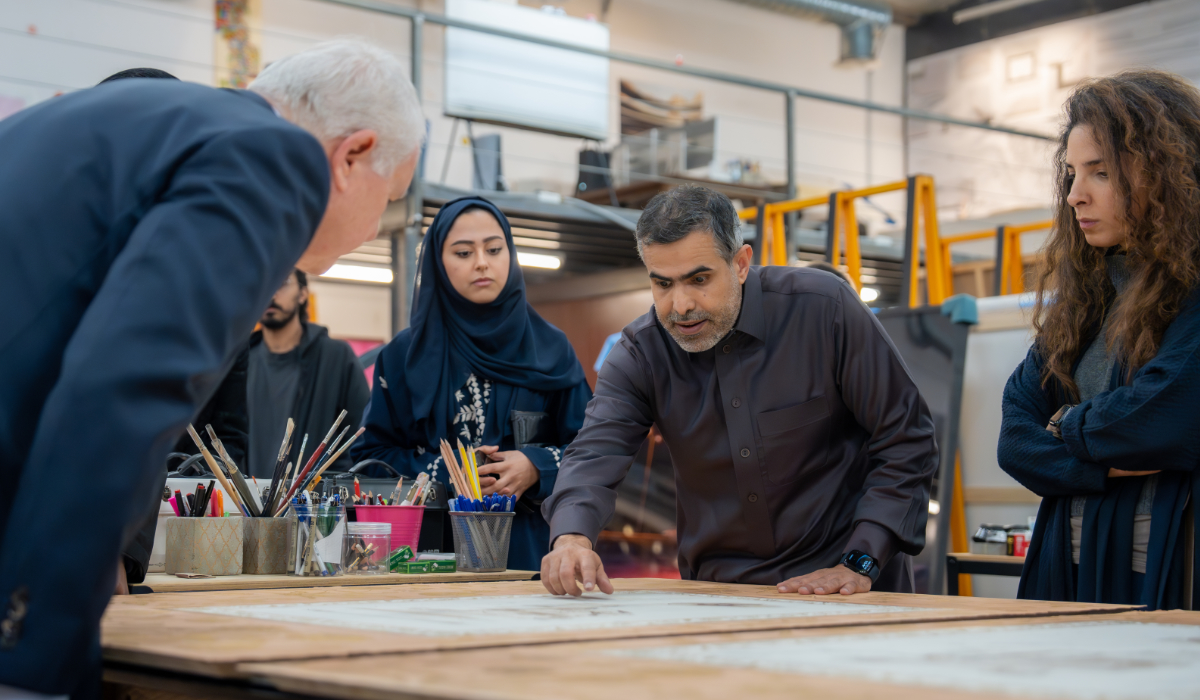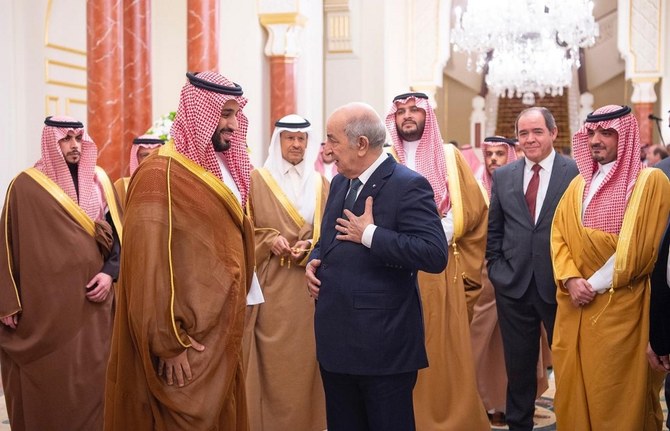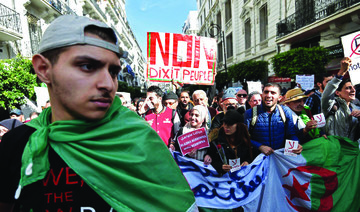DUBAI: Saudi Arabia’s King Salman and Crown Prince Mohammed Bin Salman sent letters to the Algerian president after he tested positive with the coronavirus, state news agency SPA reported.
The two royals sent the messages to Abdelmadjid Tebboune after he was hospitalized in Germany, wishing him a speedy recovery.
Tebboune is said to be in a stable condition after undergoing medical tests, officials said Thursday, days after suspected coronavirus cases were reported among his aides.
The 74-year-old president, was transferred Wednesday to Germany from an Algerian hospital.
Representatives from his office said: “The medical team says that the results of the tests are reassuring.”
The president “has begun to receive the adequate treatment,” it said, without giving further details.
Tebboune’s transfer to Germany came after officials on Saturday said he had “voluntarily” gone into self-isolation for five days amid reports several officials in the presidency and government had contracted the Covid-19 disease.
On Tuesday, Tebboune, a heavy smoker, was admitted into a “specialized care unit” in a military hospital in Algeria’s capital.
His hospitalization comes ahead of a referendum to be held Sunday on constitutional reforms that the government hope will satisfy a protest movement. The vote is a flagship initiative of Tebboune.
Algeria has seen a resurgence in novel coronavirus cases in recent weeks.
More than 57,300 infections have been recorded in the country of 44 million, including 1,949 deaths.
(with agencies)
Saudi’s King Salman, Crown Prince send letters to COVID-positive Algerian president
https://arab.news/zencb
Saudi’s King Salman, Crown Prince send letters to COVID-positive Algerian president

- The two royals sent the messages to Abdelmadjid Tebboune after he was hospitalized in Germany
- Tebboune is said to be in a stable condition after undergoing medical tests
New study documents reptile species in King Abdulaziz Royal Reserve

- Researchers identified 31 species — 25 lizards and six snakes — following 1,551 field observations within the reserve
RIYADH: A groundbreaking scientific study has unveiled the first detailed list of reptile species in the King Abdulaziz Royal Reserve in Saudi Arabia, the Saudi Press Agency reported on Tuesday.
Conducted by the reserve’s development authority, the study was published in the Amphibian & Reptiles Conservation journal.
Researchers identified 31 species — 25 lizards and six snakes — following 1,551 field observations within the reserve. Three species were also newly documented, raising the reserve’s known total to 34.
The research highlighted two endangered species, the Egyptian monitor lizard (Uromastyx aegyptia) and the Wolfgangboehmei gecko (Tropicolotes wolfgangboehmei), which both face threats from climate change and human activity, according to the study.
Spanning from November 2022 to October 2023, the study employed tools such as genetic barcoding and highlighted the reserve’s ecological diversity.
Aligned with the Kingdom’s Vision 2030 program and the Saudi Green Initiative, the study is part of efforts to protect endangered species and sustain wildlife in Saudi Arabia. Researchers recommended enhanced monitoring and adaptive conservation strategies to mitigate environmental challenges.
Gulf Print and Pack expo debuts in Saudi Arabia

- Event aligns with Kingdom’s goal of replacing imports with domestic production
RIYADH: Gulf Print and Pack 2025 debuted in Saudi Arabia on Tuesday, highlighting the latest technologies, innovations and sustainable solutions from over 150 exhibitors.
The event is poised to play a pivotal role in advancing the region’s printing and packaging industries while aligning with Saudi Vision 2030 goals.

Event director Barry Killengrey told Arab News that hosting GPP in Saudi Arabia was a long-standing aspiration for the organizers. He said its expansion was made possible by a partnership with Informa Tahaluf, a company with a local presence.
“The GPP event in Dubai runs every two years, so this was a timely fashion where we could effectively have one event each year,” he said. “So 2025 was a focus on Saudi Arabia, especially as it aligns with the country’s goal to replace imports with domestic production.”

The event seeks to encourage collaboration and innovation within the commercial printing and packaging sectors, particularly in developing markets like Saudi Arabia. Killengrey said it created vast opportunities across the printing and packaging spectrum.
“In such markets, industries are more fluid compared to the highly specialized and consolidated markets in developed regions,” he explained, adding that commercial printers might move into packaging, and packaging converters might also have a commercial print business.
This isn’t just about showcasing technology. It’s about creating opportunities, driving growth and shaping the future of an industry that is vital to the region’s economic development.
Barry Killengrey, Gulf Print and Pack 2025 event director
“These industries are highly entrepreneurial and tend to seize faster-growing opportunities,” he said.

Killengrey also highlighted the crossover between packaging machinery and printing operations.
“For instance, co-packers often print their own packaging materials, and brand owners or specifiers seek events where they can explore a wide range of machinery applications and market opportunities,” he told Arab News.

The next generation was also creating a much better appetite for longevity in printing and sustainability. Whether it was direct mail, menus or advertising, a focus on sustainable products was key, he added, acknowledging the challenges faced by global brands — particularly in the food and beverage industries — to adopt sustainable practices.
Killengrey said the expo addressed these by emphasizing innovation, design, shorter production runs and the use of diverse, environmentally friendly materials.
He added rapid advancements in digital printing and packaging technologies were expected to grow significantly over the next five to 10 years.
The event also features innovations in digital embellishment, automation and pre-and post-press workflows, offering attendees insights into the latest capabilities in flexible packaging, plate-making, cutting machines, folding machines, and corrugation technologies.
Digital technology is a key theme for the event, emphasizing their transformative potential for the industry.
“This isn’t just about showcasing technology,” Killengrey said. “It’s about creating opportunities, driving growth and shaping the future of an industry that is vital to the region’s economic development.”
Cultural convergence: Saudi artist, US jazz legend unite in an evening of musical exchange

RIYADH: In an evening of musical and cultural exchange, Saudi artist Ahmed Mater hosted an American delegation of musicians featuring jazz legend Herbie Hancock, Manhattan Transfer singer Janis Siegel, and local Saudi artists in his studio in JAX on Monday.
“One of the most important aspects of this visit was the arts. The arts intersect and converge … art such as jazz, contemporary art, visual art, there is a dialogue between them,” Mater told Arab News.
He also underlined the importance of “dialogue between art that is local, Saudi, and historical, and art that is western, American, (such as) jazz.”

Mater himself specializes in a range of art forms including photography, video, sound, installations, video art, filmmaking and drawing.
His studio in JAX is filled with historical books, vintage film reels, and equipment, along with art supplies that he offers to artists for learning and creating. His mission is to use the studio as a foundation to support and nurture artistic talent.
Mater welcomed local Saudi artists and American musicians from the Herbie Hancock Institute of Jazz Performance at the University of California, Los Angeles to his studio for a private tour and discussion.
Davida MacDonald, cultural attache at the US Embassy, attended the gathering and outlined her experience touring the studio with the delegation of musicians.
“Dr. Ahmed Mater is a legend … I always love coming here. It is just a place of creative ferment, there are filmmakers and artists and musicians,” she said. “We are so excited the US Embassy has partnered with the Saudi Music Commission and the Ministry of Culture to bring these jazz legends to the Kingdom for the first time.”
Hancock’s visit to the Kingdom is part of a celebration of Saudi-US cultural ties, sponsored by the Arts Envoy Program from the US Bureau of Educational and Cultural Affairs, the Saudi Music Commission, the Ministry of Culture, Music Hub, and the King Fahd Cultural Center.
“The genuine interest and affection with which this group of stellar musicians has been received by Saudi musicians, as well as the public at large, is just a testament to the energy, dynamism and creativity of the Saudi music scene,” she said.
The cultural attache underlined the importance of the visit, which she described as a “two-way exchange” with “American jazz musicians sharing their craft with Saudi musicians and learning from Saudi musicians.”
MacDonald said the tour was meant to be a five-minute affair but instead lasted an hour, with detailed discussions of art and music.
Mater said that Hancock had “a unique and memorable reaction” to the studio and that “the spirit of his visit was friendly and familiar, rather than formal,” leading to a longer and more comprehensive tour.
“For example, he (Hancock) was curious and asked me about Saudi artists and the music they make, such as Mohammed Abdu, whose pictures were presented in the studio.”
Mater highlighted that his colleague and fellow artist in the studio, Abdullah Al-Qarni, a qunun player and maker, was present and played alongside Hancock in a spur-of-the-moment performance.
“The studio team was present and Al-Qarni played the qunun and explained the eastern and western maqams. They worked on comparing how the sounds resonated,” he said.
Afterward, Al-Qarni and Mater presented Hancok with a qunun to take with him back to the US.
“It was a beautiful night for everyone,” Mater said. “Art, like jazz, fine art, and visual art … there is a dialogue between them, this is the beauty of today.”
KSA welcomes record 18.5m pilgrims in 2024

- Makkah Taxi launches to enhance pilgrim mobility
- Fleet is expected to grow to about 1,800 vehicles by the end of 2025
JEDDAH: Saudi Arabia’s Minister of Hajj and Umrah Tawfiq Al-Rabiah announced that more than 18.5 million pilgrims visited Makkah and Madinah in 2024. This includes 16,924,689 Umrah performers and 1,611,310 Hajj pilgrims.
The minister revealed the record-breaking figures at the fourth Hajj and Umrah Services Conference and Exhibition in Jeddah, which runs until Jan. 16.
The event, themed “The Road to the Nusuk,” is hosted by the Ministry of Hajj and Umrah and the Pilgrim Experience Program, featuring more than 300 local and international organizations displaying innovations to improve the pilgrim experience.
The event included the launch of Makkah Taxi, a new transport service developed by the Royal Commission for Makkah City and Holy Sites, the Saudi Press Agency reported.
Makkah Taxi began operations on Jan. 13, being introduced in phases for a smooth transition. The service operates around the clock with 47 locations around Makkah, including key stations and areas near the Grand Mosque.
Minister of Transport and Logistic Services Saleh Al-Jasser presented the operating license to the winning company.
The fleet is expected to grow to about 1,800 vehicles by the end of 2025, enhancing transport services for Makkah’s growing demand, SPA reported.
Passengers can pay with cash or credit cards, with fares regulated by the Public Transport Authority.
The fleet features advanced surveillance systems, smart sensors, emergency buttons, and a dedicated customer service center for added security and convenience.
Saleh Al-Rasheed, CEO of the commission, said that the vehicles are environmentally friendly and highly reliable, operating on hybrid and electric systems.
This reinforces Makkah’s position as a smart, sustainable city that blends technological advances with improved experiences for pilgrims, Umrah performers, and residents, he said.
Meanwhile, the Ministry of Interior is displaying security systems powered by artificial intelligence, equipment, and digital solutions for crowd management at holy sites.
The ministry’s pavilion highlights the “No Hajj Without a Permit” campaign, aimed at raising awareness of Hajj regulations, ensuring pilgrims obtain official permits, and supporting security and organizational efforts to provide a safe experience.
The Makkah region principality’s pavilion promotes awareness and regulatory compliance, while the Madinah region principality focuses on services for pilgrims and Umrah performers.
The four-day event features 47 discussion sessions, 50 workshops, and more than 130 speakers addressing sustainability, eco-friendly technologies, AI in crowd management, and opportunities for startups in the Hajj sector.
In collaboration with the Ministry of Hajj and Umrah, Umm Al-Qura University is organizing the “Humanizing the Holy Sites” hackathon, inviting students, entrepreneurs and specialists to develop sustainable solutions that enhance the pilgrim experience and reduce environmental impact.
Saudi representative at Arab League receives Arab Parliament speaker in Cairo

- Al-Yamahi said he appreciated the role of the Kingdom, led by King Salman and Crown Prince Mohammed bin Salman, in strengthening the system of joint Arab action
RIYADH: Saudi Arabia’s permanent representative to the Arab League, Ambassador Abdulaziz bin Abdullah Al-Matar, received the speaker of the Arab Parliament, Mohammed Ahmed Al-Yamahi, at the delegation’s headquarters in Cairo on Tuesday.
During the meeting, they reviewed existing parliamentary cooperation between the Kingdom and the Arab Parliament. They also discussed ways to enhance joint Arab action and other topics of common interest, Saudi Press Agency reported.
Al-Yamahi said he appreciated the role of the Kingdom, led by King Salman and Crown Prince Mohammed bin Salman, in strengthening the system of joint Arab action and enhancing Arab solidarity through the pioneering initiatives adopted by Saudi Arabia in dealing with the various crises across the Arab region.






















